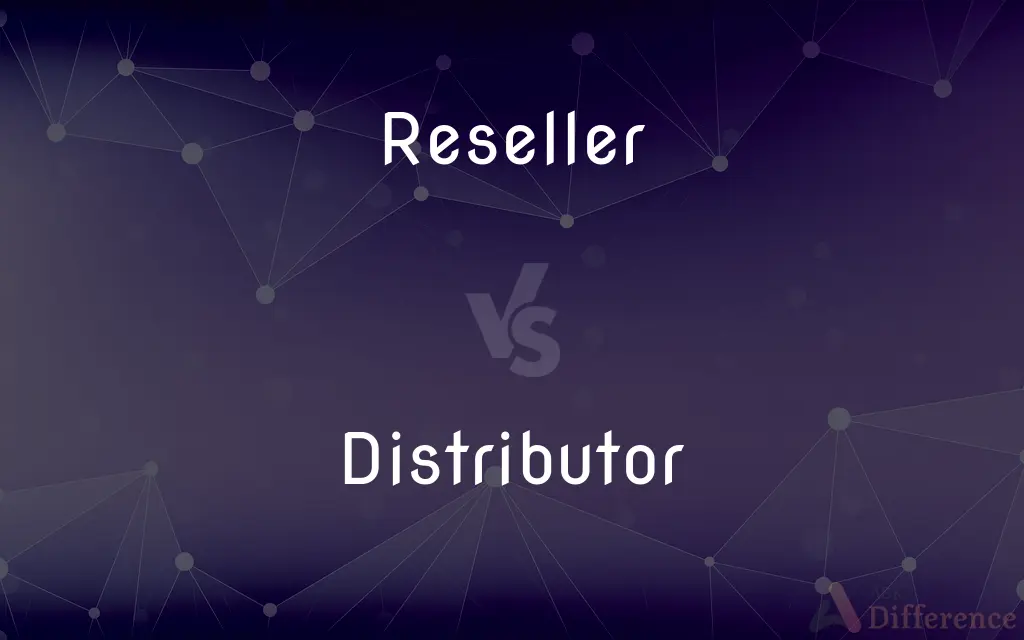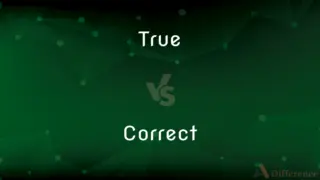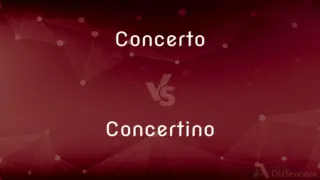Reseller vs. Distributor — What's the Difference?
Edited by Tayyaba Rehman — By Fiza Rafique — Updated on October 5, 2023
A reseller purchases products to sell them to end consumers, often without significantly altering or adding value. A distributor buys products from manufacturers and sells them to resellers or retailers, often providing added services or support.

Difference Between Reseller and Distributor
Table of Contents
ADVERTISEMENT
Key Differences
Both resellers and distributors play pivotal roles in the product supply chain, bridging gaps between manufacturers and end consumers. Resellers, as the name suggests, focus primarily on selling products directly to consumers or businesses. They purchase goods and resell them, sometimes specializing in specific niches or industries. Distributors, however, function a step before the reseller in the distribution process. They buy products in bulk from manufacturers and then distribute these to various resellers, retailers, or sometimes directly to large end consumers.
One of the main distinctions between resellers and distributors lies in their operational scales and scopes. Distributors generally engage in bulk purchases and may have exclusive agreements with manufacturers to distribute products within specific regions. They might also offer added services like product training, after-sales support, or marketing assistance. Resellers, on the other hand, typically operate on a smaller scale, purchasing products from distributors rather than manufacturers.
It's also crucial to understand the value addition each provides. While distributors may not directly engage with the average consumer, they add value by facilitating the product's journey from the manufacturer to various marketplaces, providing logistical support, warehousing, and sometimes credit facilities to resellers. Resellers, meanwhile, connect directly with the end consumer or business, offering them the products they seek, and might add value through services like installation, customization, or direct customer support.
From a relationship standpoint, resellers often rely on distributors for consistent product supply, especially if the distributor has exclusive rights for certain products in a region. Distributors, in contrast, depend on resellers to penetrate the market deeply, reaching various consumer segments and niches.
To encapsulate, while there's a synergy between resellers and distributors, their roles, scale, and relationships with both manufacturers and consumers differ. Distributors act as vital intermediaries between the manufacturer and the reseller, while resellers connect the product chain to the end consumer.
ADVERTISEMENT
Comparison Chart
Definition
Entity that buys products to sell to end consumers.
Entity that acquires products from manufacturers for resale.
Relationship
Directly serves end consumers or businesses.
Serves resellers, retailers, or large end consumers.
Scale
Typically smaller scale operations.
Often operate on a larger scale with bulk purchases.
Value Addition
Direct sales, installation, or specific customer support.
Logistics, marketing support, training, and bulk supply.
Purchase From
Primarily buys from distributors.
Buys directly from manufacturers.
Compare with Definitions
Reseller
A business that sells products without significantly modifying them.
The online platform became a popular reseller of refurbished gadgets.
Distributor
An entity that plays a crucial role in the product supply chain, connecting manufacturers to the market.
As a leading distributor, they had partnerships with major global brands.
Reseller
An intermediary that buys and resells without large-scale value addition.
The boutique was a reseller of several high-end fashion labels.
Distributor
A company that specializes in the logistics and sale of products to businesses.
Their role as a distributor involved warehousing, sales, and marketing support.
Reseller
A company that purchases products for direct market sales.
As a software reseller, they provided clients with various digital solutions.
Distributor
A business responsible for the widespread availability of products in a market or region.
The company grew by establishing strong distributor networks in various countries.
Reseller
An enterprise that retails products sourced from distributors or wholesalers.
The bookstore became the leading reseller of educational materials in the region.
Distributor
An intermediary that provides products to retailers or resellers.
The distributor supplied goods to various retailers across the state.
Reseller
An entity that acquires goods to sell them to consumers.
The local tech store is a reseller of various electronic brands.
Distributor
A distributor, also commonly known as a dizzy, is an enclosed rotating shaft used in spark-ignition internal combustion engines that have mechanically timed ignition. The distributor's main function is to route secondary, or high voltage, current from the ignition coil to the spark plugs in the correct firing order, and for the correct amount of time.
Reseller
A reseller is a company or individual (merchant) that purchases goods or services with the intention of selling them rather than consuming or using them. This is usually done for profit (but could be resold at a loss).
Distributor
An agent who supplies goods to retailers
A sports goods distributor
Reseller
To sell again.
Distributor
A device in a petrol engine for passing electric current to each spark plug in turn.
Reseller
To sell (a product or service) to the public or to an end user, especially as an authorized dealer.
Distributor
One that distributes, especially a device that applies electric current in proper sequence to the spark plugs of an engine.
Reseller
A company or individual that purchases goods or services with the intention of reselling them rather than consuming or using them.
Distributor
One that markets or sells merchandise, especially a wholesaler.
Distributor
One who or that which distributes.
Distributor
A device that distributes electric current, especially to the spark plugs in an internal combustion engine.
Distributor
A machine for distributing type.
Distributor
An appliance, such as a roller, in a printing press, for distributing ink.
Distributor
One that distributes; a distributer;
Distributor
Someone who markets merchandise
Distributor
A person with authority to allot or deal out or apportion
Distributor
A company that markets merchandise;
His company is a large distributor of software products
Distributor
Electrical device that distributes voltage to the spark plugs of a gasoline engine in the order of the firing sequence
Distributor
A business that buys products from manufacturers for resale.
The firm became the exclusive distributor of the brand in the region.
Common Curiosities
Do resellers manufacture any products?
Typically, resellers don't manufacture but buy and resell products.
Can a distributor also be a manufacturer?
Yes, some manufacturers also act as distributors for their products.
Why might a manufacturer choose not to sell directly to consumers?
Selling through distributors and resellers allows manufacturers to reach broader markets without managing individual sales.
Do resellers always buy from distributors?
Mostly, but some resellers might also buy directly from manufacturers, depending on the scale and relationship.
How do distributors add value to products?
Distributors can add value through logistics, marketing support, training, and providing after-sales services.
Do distributors set the retail price of a product?
Distributors might suggest a retail price, but resellers often have the flexibility to set the final price.
Can a reseller sell multiple brands?
Yes, many resellers offer a range of products from different brands.
How do resellers profit?
Resellers typically mark up the price of products they buy from distributors to make a profit.
Is a franchisee a reseller?
Yes, a franchisee can be considered a type of reseller, but they usually follow stricter guidelines set by the franchisor.
Can a business act as both a distributor and a reseller?
Yes, some businesses might buy products in bulk and distribute them while also selling directly to consumers.
Can a distributor sell directly to the public?
While distributors primarily sell to resellers, some might also sell to large end consumers or directly to the public.
How do resellers decide which distributor to buy from?
Factors might include product pricing, support services, delivery times, and the distributor's reputation.
How do manufacturers support distributors?
Manufacturers can offer training, marketing materials, volume discounts, and exclusive distribution rights.
What's the advantage of a manufacturer using distributors?
Distributors can quickly get products into various markets, manage logistics, and support marketing efforts.
Are wholesalers and distributors the same?
While both deal in bulk sales, distributors often provide added services like marketing support, unlike wholesalers.
Share Your Discovery

Previous Comparison
True vs. Correct
Next Comparison
Concerto vs. ConcertinoAuthor Spotlight
Written by
Fiza RafiqueFiza Rafique is a skilled content writer at AskDifference.com, where she meticulously refines and enhances written pieces. Drawing from her vast editorial expertise, Fiza ensures clarity, accuracy, and precision in every article. Passionate about language, she continually seeks to elevate the quality of content for readers worldwide.
Edited by
Tayyaba RehmanTayyaba Rehman is a distinguished writer, currently serving as a primary contributor to askdifference.com. As a researcher in semantics and etymology, Tayyaba's passion for the complexity of languages and their distinctions has found a perfect home on the platform. Tayyaba delves into the intricacies of language, distinguishing between commonly confused words and phrases, thereby providing clarity for readers worldwide.














































